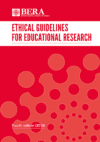This extensively revised, expanded and updated fourth edition of BERA’s Ethical Guidelines for Educational Research is designed to support educational researchers in conducting research to the highest ethical standards in any and all contexts.
They unequivocally recognise and celebrate the diversity of approaches in educational research, and promote respect for all those who engage with it: researchers and participants, academics and professional practitioners, commissioning bodies, and those who read and utilise the research. Without being prescriptive, they represent the tenets of best ethical practice that have served our community of researchers well in the past, and will continue to do so in the future.
This edition has been updated to take account of the many new developments that have affected educational research since the publication of the third edition in 2011, including the rise of social media and online communities, new legislative requirements, and the growing impact on our research of internationalisation and globalisation. It also includes a wealth of links to other resources on ethics, legislative requirements and best practice.
The intended audience for these guidelines is anyone undertaking educational research – be they people whose job description includes research, or others who, for a variety of reasons (including studying for a qualification or with the intention of improving practice), conduct research within the field. This includes both independent researchers and those based in educational institutions of any kind (including but not limited to early years settings, schools, colleges and universities).



Responses